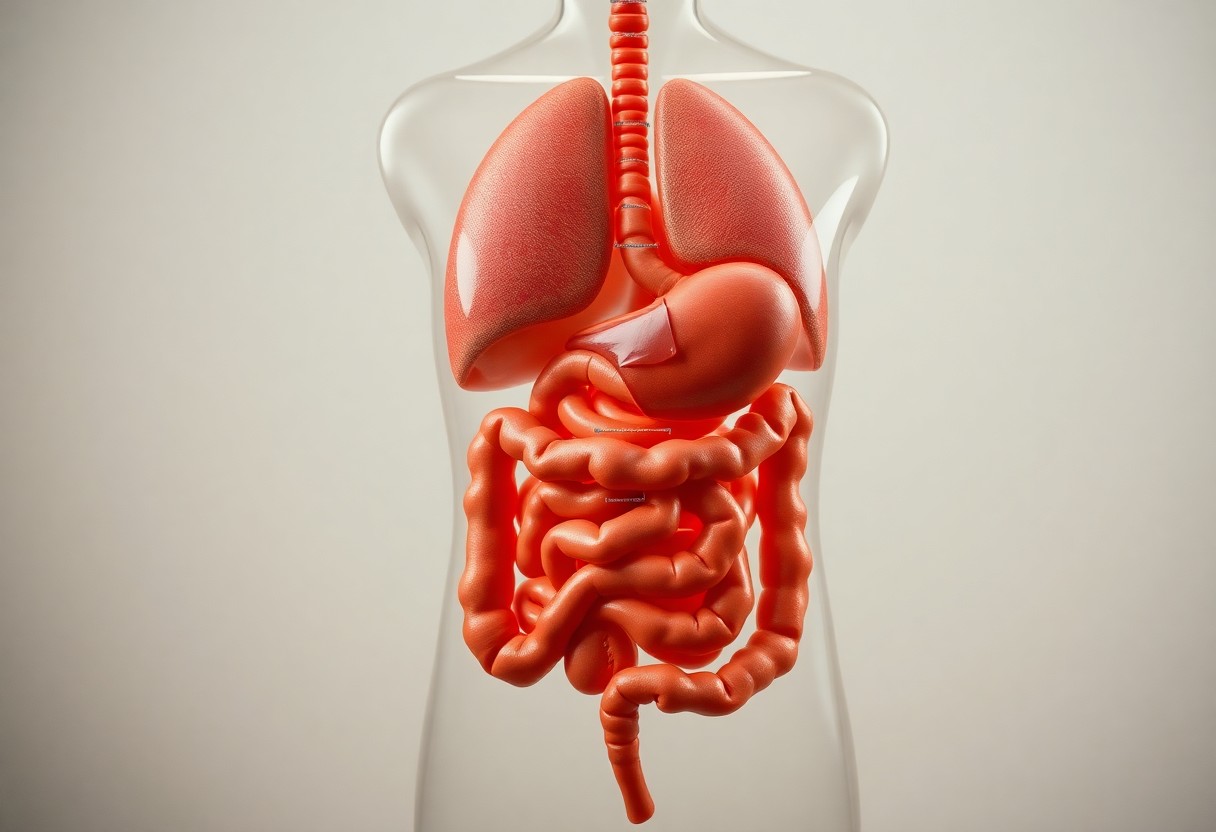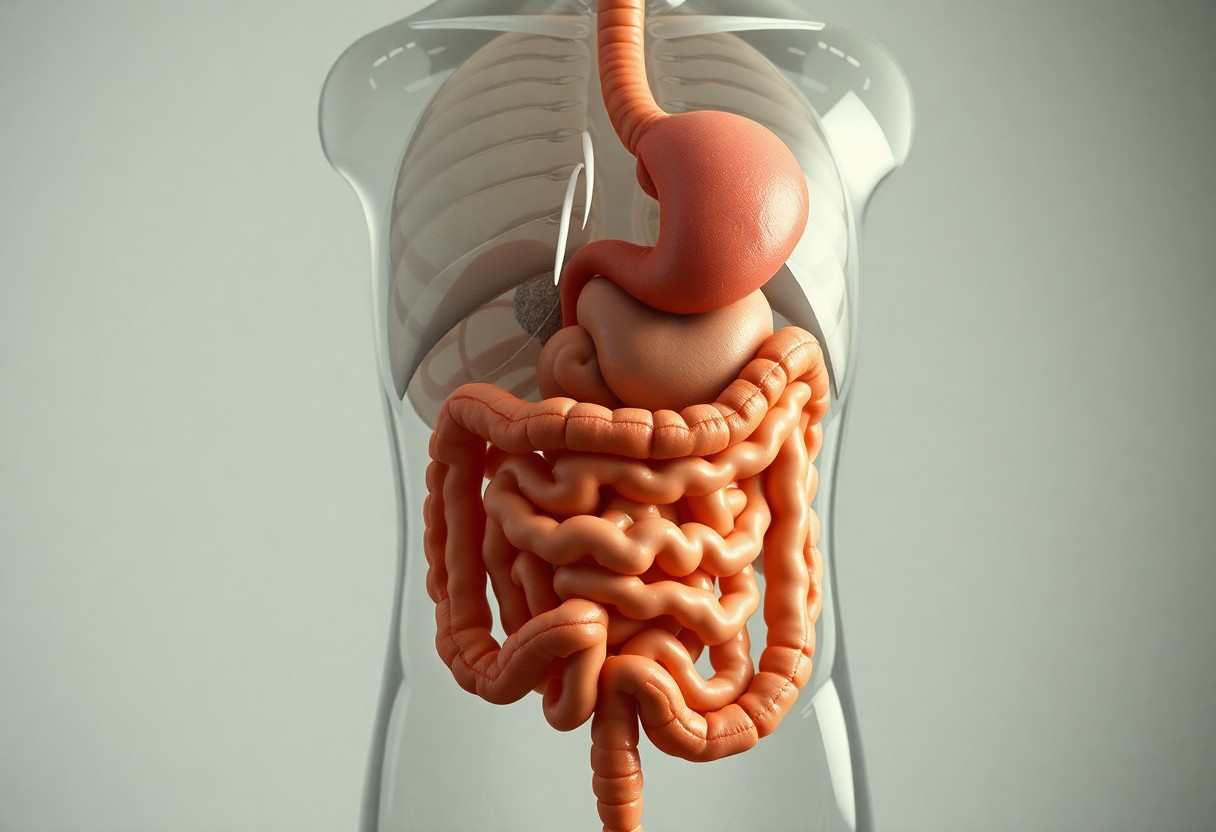Most people don’t realize the complexity and efficiency of the human digestive system, which plays a vital role in your overall health. By breaking down food into vital nutrients, this intricate system allows your body to absorb what it needs for energy, growth, and repair. In this blog post, you will explore the key functions of the digestive system and gain a clearer understanding of how it works, ensuring you appreciate the significance of this remarkable process.

Overview of the Digestive System
The digestive system is a complex network that breaks down food into important nutrients your body needs to function effectively. It transforms what you consume into energy and waste, ensuring that nutrients are absorbed while eliminating what is not needed. For a deeper look into the anatomy of the digestive system, check out this article on Digestive System (Anatomy): How It Works.
Anatomy of the Digestive Tract
Before discussing the key functions, it is important to understand the anatomy of your digestive tract. This extensive tube extends from your mouth to your anus, comprising various segments such as the esophagus, stomach, small intestine, and large intestine, each playing unique roles in digestion.
Key Digestive Organs and Their Functions
Tract components work in concert to ensure that digestion is effective. Each organ, from the salivary glands to the liver, has specialized tasks that contribute to breaking down food, absorbing nutrients, and processing waste. The tongue and teeth initiate mechanical digestion, while enzymes break down carbohydrates, proteins, and fats.
Understanding these organs' roles can significantly improve your knowledge of how digestion impacts your overall health. The stomach, for instance, not only holds food but also employs powerful acids and enzymes to further breakdown contents, while the small intestine is where most nutrient absorption occurs. The liver plays a vital role in detoxification and metabolism, highlighting the interconnectedness of these organs in maintaining your well-being.
The Digestion Process
Even though the human digestive system is a complex network, its primary function is to break down food into necessary nutrients for your body. This intricate process begins in your mouth and continues through various organs, ultimately ensuring that your body receives the necessary components for energy and overall health. For more detailed insights, visit Digestive system | healthdirect.
Ingestion
An necessary first step in the digestion process is ingestion, where you start consuming food. As you take bites, your teeth break the food into smaller pieces, mixing it with saliva, which contains enzymes to begin the digestive process.
Mechanical and Chemical Digestion
Mechanical digestion involves the physical breakdown of food, while chemical digestion relies on enzymes to convert food into absorbable molecules. Together, these processes ensure that food is thoroughly prepared for nutrient absorption in your intestines.
Understanding the dynamic interplay between mechanical and chemical digestion enhances your comprehension of how your body processes food. Mechanical digestion occurs through chewing and the churning actions of your stomach, which physically reduce food size. Meanwhile, enzymes from your saliva and gastric juices meld with food to break it down chemically, transforming it into a semi-liquid state called chyme. This dual approach ensures maximum nutrient extraction as the food progresses through your digestive tract.

Absorption of Nutrients
Not all the food you consume is completely used by your body; the absorption of nutrients plays a significant role in transforming what you eat into energy and building blocks important for health. The digestive system carefully extracts vitamins, minerals, carbohydrates, fats, and proteins, ensuring that your body receives what it needs for optimal function.
Small Intestine Role
Along your digestive pathway, the small intestine serves as the primary site for nutrient absorption. As partially digested food enters this section, specialized cells transport vital nutrients into your bloodstream, allowing them to be delivered to your organs and tissues effectively.
Large Intestine Contributions
Among the roles of the large intestine, water absorption and the breakdown of undigested food remain primary functions that greatly benefit your overall health.
Nutrients that your body cannot digest enter the large intestine, where bacteria ferment them, producing certain vitamins like B and K. Additionally, this section absorbs any remaining water and electrolytes, which helps maintain your hydration balance. Ultimately, the fermentation process generates short-chain fatty acids that can serve as an energy source for your cells, showcasing how the large intestine contributes positively to your nutritional needs.
The Role of Digestive Enzymes
Unlike other biological processes, the digestive system relies heavily on digestive enzymes to break down food into nutrients that your body can absorb. These enzymes are specialized proteins that facilitate chemical reactions, ensuring that carbohydrates, fats, and proteins are efficiently processed within your gastrointestinal tract. Without these enzymes, digestion would slow significantly, impacting your overall health.
Types of Digestive Enzymes
On the journey through your digestive system, various types of enzymes play vital roles. Here’s a quick breakdown:
| Enzyme Type | Main Function |
| Amylase | Breaks down carbohydrates |
| Lipase | Breaks down fats |
| Protease | Breaks down proteins |
| Sucrase | Breaks down sugars |
- Amylase
- Lipase
- Protease
- Sucrase
- This highlights the diversity of digestive enzymes in your body.
Importance of Enzymatic Action
For optimal digestion, the action of enzymes in your digestive system is necessary. By breaking down complex food substances into simpler forms, these enzymes allow your body to absorb nutrients efficiently, fueling your daily activities and supporting overall health.
Importance of enzymatic action cannot be overstated. Enzymes not only enhance nutrient absorption but also aid in preventing digestive disorders, allowing for smoother digestion. When enzymes function effectively, they help maintain a balanced gut environment, which is necessary for your overall well-being. Thus, supporting your digestive health can significantly impact your energy levels and nutritional status.
Common Digestive Disorders
Once again, it's important to understand that digestive disorders can affect anyone. Conditions such as Gastroesophageal Reflux Disease (GERD) and Irritable Bowel Syndrome (IBS) can lead to discomfort and other health issues. To gain insights into Your Digestive System and how these disorders manifest, you can explore additional resources that can help equip you with the knowledge to address these challenges.
Gastroesophageal Reflux Disease (GERD)
Beside affecting your daily life, Gastroesophageal Reflux Disease (GERD) occurs when stomach acid flows back into your esophagus, causing symptoms like heartburn and regurgitation. Changes in diet and lifestyle, as well as medical interventions, can help manage these symptoms effectively.
Irritable Bowel Syndrome (IBS)
By understanding Irritable Bowel Syndrome (IBS), you can better navigate the challenges it presents. IBS is a common disorder that causes abdominal pain, bloating, and irregular bowel habits. While the exact cause remains unclear, managing symptoms often includes dietary changes and stress management strategies.
Disorders like IBS can significantly impact your quality of life. You might experience a range of symptoms that can be unpredictable and frustrating. It is vital to consult a healthcare professional to determine the best management plan tailored to your needs. Dietary modifications, such as incorporating fiber and probiotics, along with lifestyle adjustments, can greatly improve your comfort and overall well-being.
Maintaining Digestive Health
Keep in mind that maintaining digestive health is vital for overall well-being. This involves a balanced approach that combines proper nutrition, hydration, and lifestyle choices. By making conscious decisions in your daily routine, you can support your digestive system, enhance nutrient absorption, and reduce discomfort associated with digestive issues.
Dietary Suggestions
Behind every healthy digestive system is a well-thought-out diet. Incorporate a variety of fiber-rich foods, such as fruits, vegetables, and whole grains, to promote regular bowel movements. Staying hydrated by drinking plenty of water throughout the day is also key to helping your digestive organs function effectively and efficiently.
Lifestyle Modifications
One important aspect of maintaining digestive health involves implementing lifestyle modifications. Regular physical activity, for instance, can boost digestion by stimulating the gastrointestinal tract and reducing stress, which often negatively impacts digestion. Prioritizing sleep and managing stress through mindfulness practices can further enhance your digestive function.
Another effective lifestyle modification is to establish a regular eating schedule. Eating smaller, more frequent meals can help your digestive system work more efficiently, while avoiding heavy or late meals can mitigate discomfort. Consider limiting intake of high-fat and processed foods, which may interfere with digestion. Engage in mindful eating practices, paying attention to your body's hunger cues and the sensations of eating, as this fosters a healthier relationship with food and supports your digestive health.
Summing up
The human digestive system plays a vital role in your overall health by breaking down food, absorbing nutrients, and eliminating waste. By understanding the key functions of each organ involved, you can appreciate how your body processes what you consume. This knowledge empowers you to make informed dietary choices and maintain a balanced lifestyle, ultimately enhancing your well-being.
FAQ
Q: What are the main organs involved in the human digestive system?
A: The human digestive system consists of several key organs, including the mouth, esophagus, stomach, small intestine, large intestine (colon), liver, pancreas, and gallbladder. Each of these organs plays a specific role in processing food, breaking it down into nutrients, and eliminating waste.
Q: How does the digestion process begin?
A: Digestion begins in the mouth, where food is mechanically broken down by chewing and mixed with saliva, which contains enzymes that start the chemical breakdown of carbohydrates. The food then travels down the esophagus to the stomach for further digestion.
Q: What role does the stomach play in digestion?
A: The stomach serves as a storage and mixing chamber for food. It secretes gastric juices that contain hydrochloric acid and digestive enzymes, which further break down proteins and kill bacteria. The food is transformed into a semi-liquid substance called chyme before it moves on to the small intestine.
Q: How are nutrients absorbed in the digestive system?
A: Nutrient absorption primarily occurs in the small intestine. The lining of the small intestine is covered with tiny projections called villi, which increase surface area and facilitate the absorption of nutrients into the bloodstream. Carbohydrates, proteins, fats, vitamins, and minerals are absorbed and transported to various parts of the body for use or storage.
Q: What happens to undigested food in the digestive system?
A: Undigested food and waste move into the large intestine, where water and electrolytes are reabsorbed. The remaining waste is then compacted into feces, which are stored in the rectum until elimination. The large intestine also plays a role in maintaining gut health through the fermentation of certain types of dietary fiber by beneficial bacteria.

0 Comments